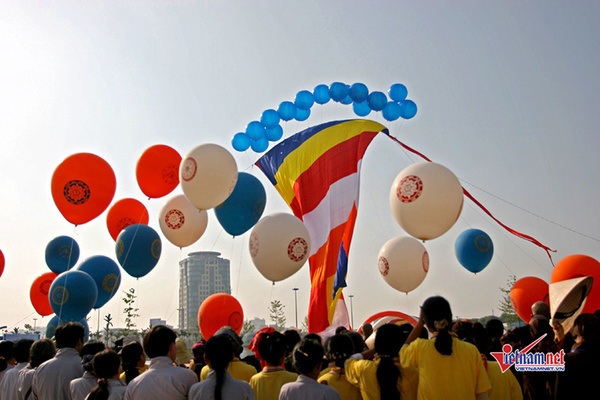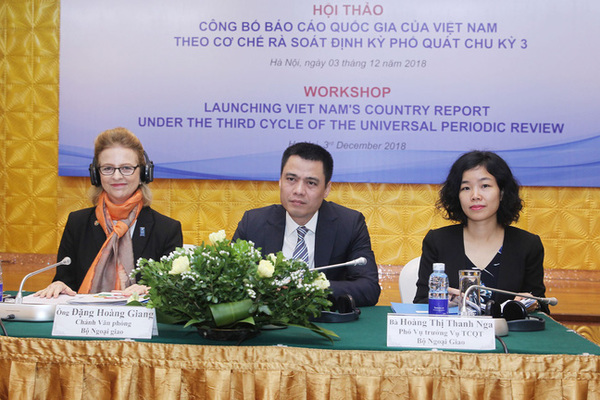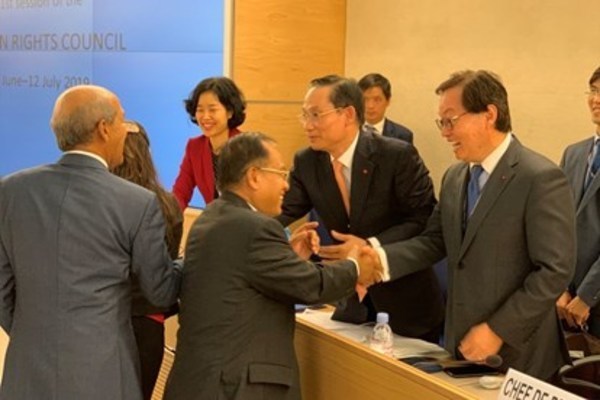 |
|
Issuing laws to concretize Vietnam's consistant policy on the freedom rights of religions and belief.
|
According to Deputy Foreign Minister Le Hoai Trung, in the process of building laws and policies, implementation and exchange with international partners, like other countries, we admit to have shortcomings that need to be fixed.
Promulgating laws to concretize Vietnam's consistent guidelines on freedom of belief and religion. Photo LAD
For example, in terms of the law, Vietnam must try to make the law more effective, to reduce the overlap and bureaucracy to better serve the people, to carry out a judicial reform strategy, and to complete the legal system. This shows that the Party and the State admit that there still exist shortcomings in the legal and judicial system.
The awareness of the people on their rights is inadequate while the capacity of officials to ensure the rights of people is still insufficient. Objective socio-economic conditions do not allow us to have the resources to ensure the desired people's rights.
Another difficulty is that some organizations and individuals abused human rights and democratic freedoms to serve their own political intentions, that are contrary to the common interests of the community and the law, affecting the process of ensuring human rights and the rights of the community.
 |
|
Vietnam will continue to promote dialogue and international cooperation activities; strengthen its participation in international human rights institutions. Illustrative image.
|
Vietnam to continue improvement of the legal system based on promoting positive aspects and achievements
In this context, in order to ensure the implementation of human rights in Vietnam in the coming time, Vietnam will keep improving the legal system based on promoting positive aspects and achievements gained in the policy on human rights. Therefore, we will have to supplement and perfect policies related to human rights issues; develop concrete measures to enforce laws on human policies.
More importantly, we must strengthen education among every citizen as well as civil servants on the human rights, on the responsibility of state agencies to ensure human rights, the responsibilities of the people as well as socio-political organizations, professional organizations in ensuring human rights.
In addition, Vietnam will continue to promote dialogue and international cooperation activities; strengthen its participation in international human rights institutions. Thereby, Vietnam can proactively introduce and share its experience with international partners on the process of ensuring human rights in Vietnam.
On the other hand, Vietnam can also learn from experiences of international partners to improve laws, policies, and implementation measures.
 |
|
2020 will be the first year Vietnam to implement the National Plans on the implementation of the results of UPR third cycle. Illustrative image.
|
The upcoming 2020 is a pivotal year in implementing many important socio-economic development programs and plans that directly affect the enjoyment of the rights of the people, which is also the first year that Vietnam will implement national plans to realize the results of the UPR third cycle, the reporting - review results at many commissions of important human rights conventions.
2020 will be also the year that Vietnam will take on important positions in international and regional organizations, realizing the Party's important guidelines on "promoting and enhancing multilateral foreign relations".
|
* The results of ensuring human rights in reality are also proven by convincing figures. According to the UNDP Report 2018, Vietnam was listed in the highly medium group in terms of the Human Development Index (116th out of 189 countries) and the Gender Equality Index (67th out of 160 countries). According to a World Bank report, the poverty rate in Vietnam continues to decline, especially among the ethnic minorities, with a sharp drop of 13%, the largest decline in the past decade. * Shortly after the establishment of the United Nations, one of the top important documents adopted by the United Nations General Assembly was the Universal Declaration of Human Rights on December 10, 1948. The Universal Declaration of Human Rights is the first document affirming a relatively comprehensive human rights, from civil, political, economic, social and cultural rights, to the right to social security and access to public services, the right to work, rest, the right to study, the right to special care of mothers and children ... |
Tran Hang
 2020 is a pivotal year for many socio-economic programs of Vietnam. " itemprop="description" />
2020 is a pivotal year for many socio-economic programs of Vietnam. " itemprop="description" />